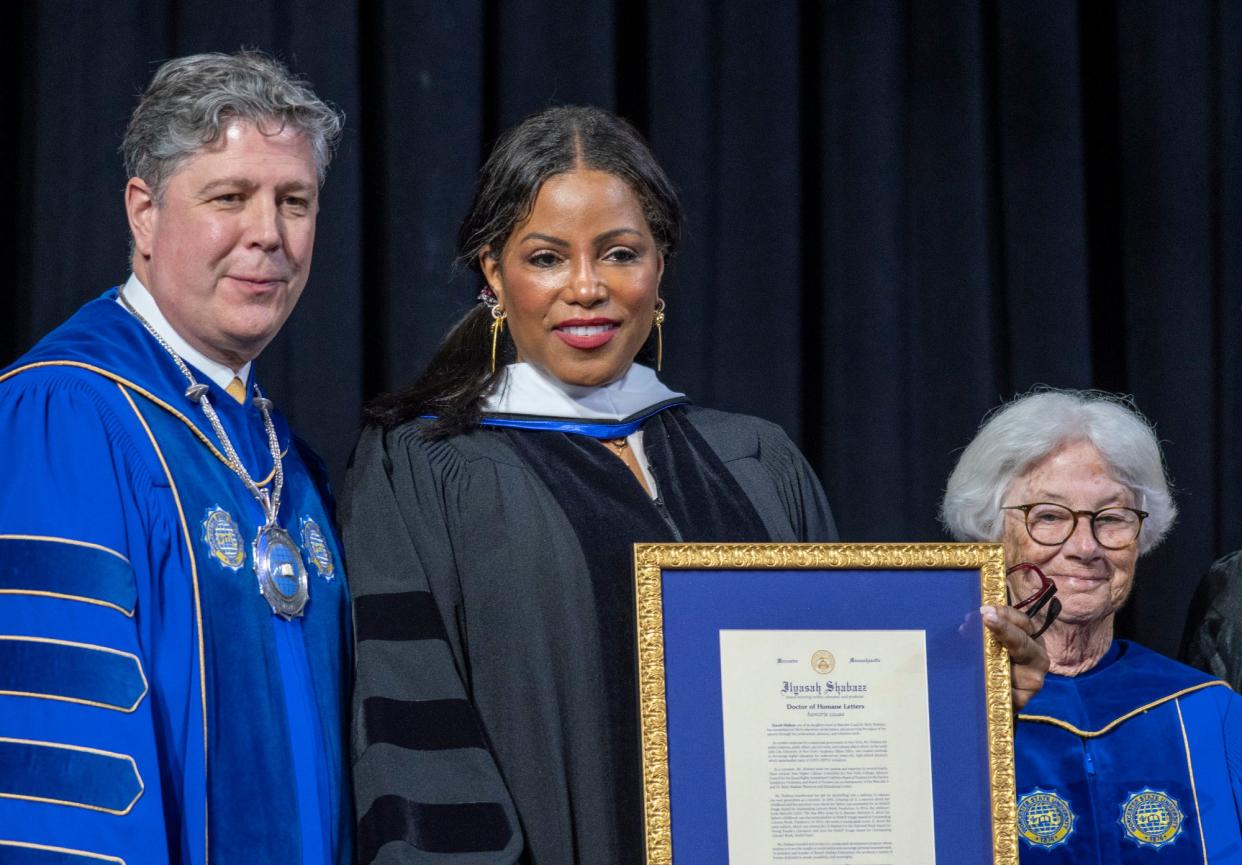Daughter of Malcolm X carries legacy as first diversity, equity fellow at Worcester State

- Oops!Something went wrong.Please try again later.
- Oops!Something went wrong.Please try again later.
WORCESTER - Ilyasah Shabazz, motivational speaker, social activist, author and daughter of civil rights figure Malcolm X, will be Worcester State University’s first Diversity, Equity and Inclusion Fellow for the 2023-2024 academic year. The DEI fellow will work with the school to support related initiatives on campus as well as teach classes. Shabazz will be teaching spring classes in the history and political science department.
She has written six books, including “Growing Up X” (2002), a memoir about her childhood and her personal views about her father, which was nominated for an NAACP Image Award for Outstanding Literary Work, Nonfiction. In 2015, she wrote a young adult novel, “X: A Novel,” about her father’s childhood, which was one of 10 finalists for the National Book Award for Young People’s Literature.
Shabazz sat down with the Telegram and Gazette to discuss her goals during her tenure at Worcester State University, carrying the legacy of her father, and how his influence can be felt in the Black Lives Matter movement.
What moved you to accept the DEI Fellowship at WSU?
I spoke at Worcester State’s 2022 commencement, and in talking with the president and many of the administrators then, I saw that Worcester State is apparently committed to a culture of excellence. We’re both seeking to embody the collective model of student transformation — and in that culture of excellence we aspire to leave a legacy for others.
There’s a saying in DEI, if you’re not at the table, you’re on the menu, and WSU is committed to creating a better table for everyone. I thought, this is what leadership looks like.
What is most important for you to pass on to students when teaching this year?
As an educator, I carry the legacy of my father by giving an inclusive education and provide a shining light on America’s complex racial history. Black history is also American history, just like Hispanic and Asian history. There’s no American history unless everyone is represented on the page.
Teaching the truth about our history is an opportunity for us to provide values of honesty, compassion and forgiveness — it’s an opportunity to be more responsible about the development of our children.
When I think about my father and his activism and compare it to this generation, I think that many have been misinformed, not only about Malcolm but about the civil rights movement. Even on a personal level, when people met me, they thought I was going to be a fiery kind of person based on what they learned of Malcolm rather than someone filled with love, peace and compassion.
Young people today are often encouraged with material things to define who they are rather than instilling specific kinds of values, such as if you see discrimination of another, you feel compelled to help and make necessary change. (Those values) can be instilled with a particular curriculum.
How do you feel your father’s ideals are represented in the current Black Lives Matter movement?
It’s so inspiring and encouraging to see young people really stepping forward and making the changes they need, not waiting for someone else to do it for them. My father took the same steps in the 1950s as a young man, when he introduced a human rights agenda to the Civil Rights Movement, similar to Black Lives Matter — the idea that all lives have value, and that America had failed in its promise of liberty and justice for all. He was only in his 20s and not much older than most college students.
We can see the spirit of his human rights advocacy today and it represents an uncompromising critique of American racism, the capacity to recognize the abuse of power.
When writing “The Awakening of Malcolm X” in 2020, I was given a figure that Malcolm X was quoted 54,000 times per hour, per day on social media in relation to Black Lives Matter and it shows that despite being misinformed about him, this generation understood his truths.
Malcolm X was a titan of the Civil Rights Movement, and you were very young when he was assassinated. Could you speak to carrying the legacy of this man that you never knew?
That's due to my mother. She would tell us when our father would and would not have been proud of us. She made sure that she kept our father’s humanity alive in our home and that we knew who our father was as a person. My mother was not even 30 when she witnessed this awful assassination and a week earlier her home had been firebombed — it's amazing how she still raised her six daughters in a bubble of love as she did.
Now, while I'm proud to be my father and mother's daughter and I stand on their shoulders, I promote my own vision. I work to accurately preserve and share history, wisdom and joy for new generations, and I'm very grateful to Worcester State for this opportunity.
This article originally appeared on Telegram & Gazette: Ilyasah Shabazz daughter of Malcolm X at Worcester State University

